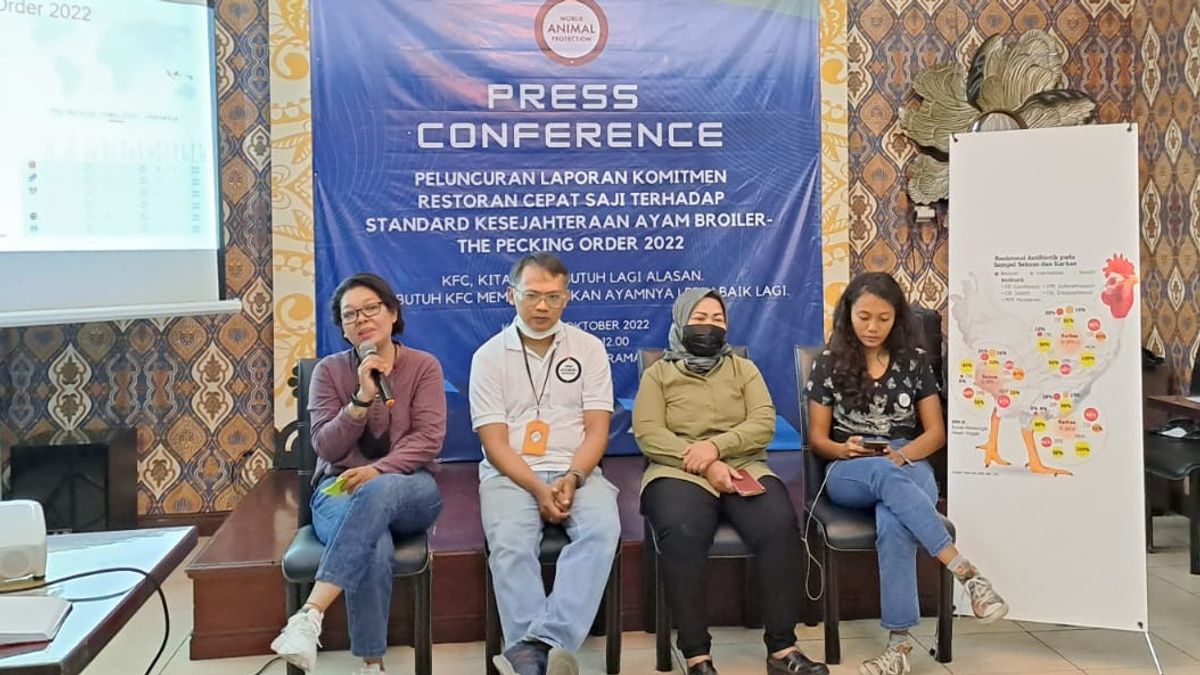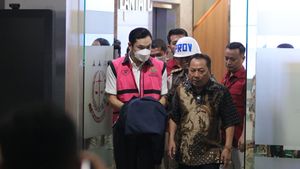JAKARTA - The global fast food restaurant network operating in Indonesia ignores the welfare of livestock consumed by consumers, based on research by the World Animal Protection (WAP) entitled The Peaking Order (TPO) 2022. This research reviews the practices of global fast food restaurants operating in Australia, Brazil, Canada, China, India, Indonesia, Kenya, Thailand, and the United States.
The fast food restaurants are Burger King, Dominos, KFC, McDonald's, Pizza Hut, Starbucks, Subway, and Nando's (the last two restaurants mentioned are not operating in Indonesia). This WAP study encourages public knowledge and awareness and fast food restaurant managers regarding good chickens for consumption come from farms that prioritize the welfare of livestock.
"We have published reports since 2020 and the latest report (TPO 2022) shows that multinational fast food restaurant managers, especially KFC Indonesia, have neglected their commitment to practice the principle of improving the welfare of livestock chickens in their supply chains," said WAP Indonesia Communications Manager Rully Prayoga, in a press release in Jakarta, Thursday, October 20.
Rully said fast food restaurant companies, namely Burger King, Domino's, KFC, McDonald's, Pizza Hut, and Starbucks, got a low score in improving the welfare of livestock, based on the assessment recorded at TPO 2022. Since 2020, WAP has routinely published TPOs to evaluate fast food restaurants and supply chains (supply chain) that practice the principle of animal welfare.
KFC Indonesia is considered very low in fulfilling its commitment to the welfare of livestock. Rully explained the research of WAP, the Indonesian Consumers Foundation (YLKI), and the science and latest research from World Animal Protection, YLKI and Center for Indonesian Veterinary Analytic Studies (CIVAS), which identified excessive antibiotic contamination in the cut chicken samples studied by this institution.
The cut chicken sample in Jabodetabek, which was studied in 2021, shows the low level of the company practices the principle of animal welfare because it fats livestock by providing excessive antibiotics so that it contains superbug bacteria so that it has the potential to trigger a pandemic," said Rully.
Based on WHO records, the excessive use of antibiotics in chickens has sparked a deadly superbug crisis that kills more than 700,000 people per year.
WAP encourages fast food restaurant companies to implement sustainable businesses based on ESG principles.
Most of the companies were listed on the stock exchange, including PT Fast Food Indonesia Tbk (FAST) or KFC Indonesia which posted revenue of IDR 2.87 trillion in the first semester of 2022, an increase of 18.1 percent from IDR 2.43 trillion in the first semester of 2021. We urge KFC Indonesia not only to focus on printing profits, but also to realize its commitment to improving the welfare of livestock and accountability to report it to consumers," Rully explained.
Meanwhile, the 2022 TPO assesses that the companies are based on information about the two pillars that are information available in public spaces. The first pillar, the fast food company is committed to improving the welfare of livestock as stated in the Better Chicken Commitment (BCC). The second pillar is about the Performance Report which reflects the implementation of fast food companies in implementing their commitments according to the BCC.
WAP noted that billions of livestock suffer every year because fast food companies and their supply chains refuse to practice the principle of animal welfare. Animal chickens in cages never get the chance to see sunlight, grow at a natural level or behave like those that live freely in the wild.
The intensive farming method also often relies on the use of routine antibiotics as a quick solution to keep stressed and sick animals alive. Not only these chickens suffer, human health is also threatened.
WAP encourages the food industry ecosystem to improve the welfare of livestock. The trick is as follows:
1. Using chicken seeds raised with ideal health levels. 2. Animal cages are designed to have a large enough room for the behavior of chickens like in the wild. Make sure theengs have room to behave more naturally3. Providing ideal tools so that the behavior of livestock is more natural. 4. Animal slaughterhouses apply a more humanized cutting principle.
The company has the ability to increase billions of livestock, and we have conducted an assessment in the last four years. As a result, they still ignore knowledge about the welfare of livestock and the wishes of consumers," said Vince Cinemas, Head of Global Campaigns WAP.
"Actually, this company understands that consumers are reluctant to buy chickens whose process ignores the welfare of livestock and is not accountable," he added.
Research on the welfare of livestock chickens is very important to be studied further to increase the accountability of fast food companies to improve the welfare of livestock.
"We encourage the company to sign the Better Chicken Commitment (BCC) and fulfill consumer aspirations so that the welfare of livestock chickens is not ignored," says Cinemas.
The English, Chinese, Japanese, Arabic, and French versions are automatically generated by the AI. So there may still be inaccuracies in translating, please always see Indonesian as our main language. (system supported by DigitalSiber.id)













